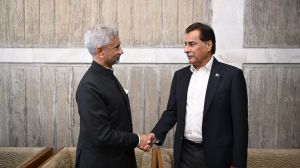Guarding the guards
Last Saturday night, the Press Information Department of the government of Pakistan put out a five-line memorandum...

Last Saturday night, the Press Information Department of the government of Pakistan put out a five-line memorandum saying the country8217;s two premier intelligence agencies, the Inter-Services Intelligence and the Intelligence Bureau, were being placed under the interior ministry.
Predictably, the news got analysts up and running. Then, even as newspapers had been put to bed and analysts had delivered themselves of their sagacity, around 4 am Sunday, the PID issued another notification which began:nbsp;8220;Notification regarding control of ISI is being misinterpreted. ISI will continue to perform its functions under the prime minister. The said notification only re-emphasises more coordination between ministry of interior and ISI.8221;
8220;Misinterpreted8221;? Why then were faces red in the process of reversal? Earlier, Asif Ali Zardari, the man with the perpetual grin who holds the reins of this government, had held forth on what he termed a 8220;historic8221; decision, one which would yield 8220;positive results8221;. Clearly, he thinks 8220;historic8221; and 8220;positive8221; are synonyms.
Zardari also said that 8220;Nobody will say that this agency is not under the control of an elected government as the interior ministry will be responsible for responding to allegations against the ISI.8221; For a helmsman, his information or the lack thereof on the organisation and role of the ISI and its linkage with the government is disconcerting to say the least.
The prime minister was of course unavailable because he had apparently chosen to sign this historic document while boarding the flight on his first official visit to the United States. The government8217;s sense of history leaves one overwhelmed; also, the PM needs to learn to clean up after himself.
Here are some facts.
One, the ISI, in theory, is and always has been under civilian control: directly under the prime minister. Compare this with military, air and naval intelligence which are under the GHQ, Air HQ, and Naval HQ, respectively.
Two, the ISI8217;s task is twofold: strategic intelligence, in which role it is an external intelligence agency; and counter-intelligence, in which role it is an internal security agency.
Three, for a long time it has also been involved in political machinations. At least one former director general, Hamid Gul, confessed to the existence of a 8220;political cell8221;. Another, Asad Durani, has denied that such a cell exists but conceded that the agency does indulge in political orchestration at the behest of whoever is in power.
Four, given geopolitical compulsions, starting with the Soviet invasion of Afghanistan, the agency has come to play a role which makes it feared.
Five, with the war on terror its role has grown. That per se is not bad: all strong states require effective intelligence capabilities.
The issue then is: did the government initially attempt to control the ISI which most observers think has become too big for its boots? If the answer is yes, then it could not have taken a worse course. The problem of 8220;effective8221; civilian control lies in the domain of lopsided civil-military relations, a structural problem that cannot be addressed through cosmetic measures.
Even if it were correct to place the ISI under the interior division, how would that make civilian control more effective? Does interior have more capacity to exercise control than the Prime Minister8217;s Secretariat? Also, if the army were to strike, the ISI would still come under the overall control of a military dispensation or one of its many hybrid incarnations.nbsp;nbsp;
The work they do means thatnbsp;all intelligence agencies tend to be rascally and roguish. V.K. Singh, in his 2007 book, India8217;s External Intelligence, examines RAW; the CIA8217;s purges during the Carter era are well-known.nbsp;But where there is civilian supremacy, mechanisms are created such as parliamentary oversight through which these agencies can be controlled without them losing their professional edge. Even so, keeping them in line requires constant, careful scrutiny.
Also, observers faulting the ISI8217;s excesses tend to forget that much of what it does internally is at the behest of whoever is in power in Islamabad, including civilian governments. Even externally, when Islamabad decided to pull in the emerging Taliban in southern Afghanistan, the ISI disagreed with the decision. It was Benazir Bhutto8217;s civilian government that managed to drag it into that policy decision which, at the time, was also blessed by the Americans.
Yes, it is necessary to keep all governmental organisations under effective control; none should be allowed to jump its brief. But is such sloppiness the way to do it?
The problems are deeper. Indeed, the way the government handled the issue shows that the problem goes beyond the supposed excesses of the ISI into the domain of decision-making. What might be wrong there and how might that be corrected is another and more cumbersome debate.nbsp;
The writer is Op-Ed Editor, 8216;Daily Times8217;, and Consulting Editor, 8216;The Friday Times8217;, Lahore. The views expressed are his own expressexpressindia.com
- 01
- 02
- 03
- 04
- 05































